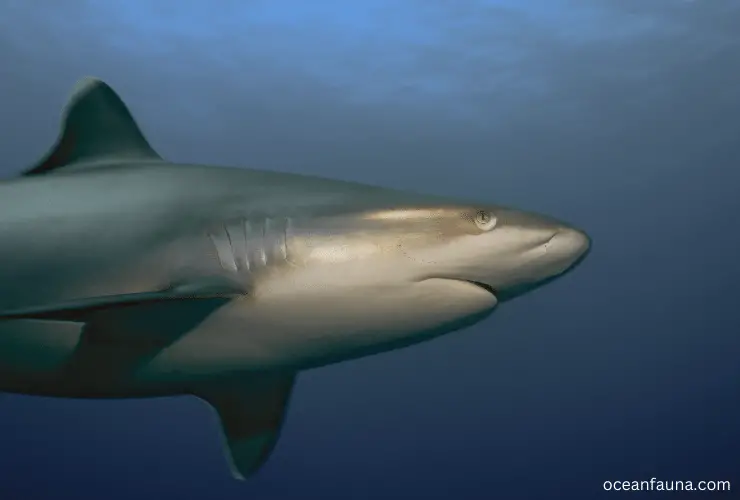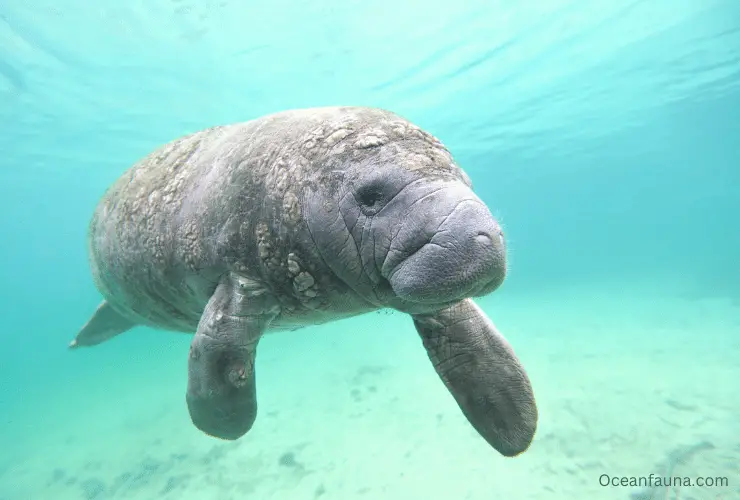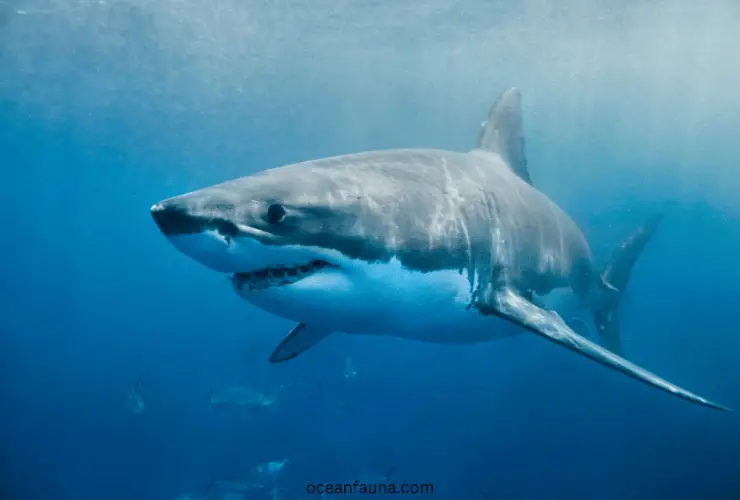Do sharks eat manatees? While it is true that sharks can eat manatees, such instances are extremely rare.
Sharks generally do not actively seek out large bony animals like manatees as part of their diet. Sharks mostly feed on small fishes, crustaceans, and other smaller animals that inhabit the same waters as manatees.
In this article, I will describe why sharks rarely feed on manatees. I will also discuss instances where manatee deaths have been attributed to shark attacks.
Do Sharks Eat Manatees?

Yes, sharks can eat manatees. However, it is not a common behavior among sharks. Typically, sharks do not actively hunt large bony animals such as manatees due to their size and the types of prey that sharks typically consume. The diet of a two-meter shark consists mainly of fish that are less than one foot in length. Hence, it is challenging for them to deal with an animal as big as a manatee.
Although documented interactions between sharks and manatees do occur, such incidents are rare. Manatees are not considered primary food for sharks, and attacks on manatees by sharks are not very common. Also, manatees usually live in very shallow waters, making it less likely for them to come into contact with larger, predatory sharks.
However, larger species of sharks can prey on manatees. Large species of sharks, such as bull, tiger, and great white sharks, have been known to attack manatees. Such incidents typically occur when manatees venture into deeper waters where these larger sharks are present. Moreover, when sick or injured, manatees become more vulnerable to sharks.
Why Don’t Sharks Primarily Prey on Manatees?
Manatees, also known as sea cows, are large, herbivorous marine mammals found in shallow waters of the Atlantic Ocean and the Gulf of Mexico. Despite their massive size, manatees are not considered primary prey for sharks. Numerous reasons can be attributed to this phenomenon.
Low Nutritional Value
One of the reasons why manatees are not considered primary prey for sharks is their low nutritional value. Manatees have a low-fat content, and their flesh is not as nutritious as other marine animals. Sharks typically prefer prey that is high in fat content, such as seals and sea lions, which provide them with a substantial amount of energy and nutrients. Therefore, sharks are less likely to target manatees as their primary prey.
Inability to Capture
Another reason why manatees are not considered primary prey for sharks is their ability to avoid attacks. Manatees are docile creatures, but they are swift swimmers. Since they are accustomed to living in shallow waters, manatees can quickly maneuver their way through narrow channels and avoid attacks from larger predators, such as sharks. As a result, manatees are not easy targets, and sharks are less likely to hunt them.
Small-mouthed Sharks
Sharks that feed on smaller fish have small mouths and cannot eat large animals like manatees. Therefore, most sharks found in shallow waters are not suited to preying on big animals built like the manatee. Their small mouths cannot take large bites of prey, which makes it difficult for them to consume a large animal like the manatee. Thus, sharks not built for larger prey would not consider manatees their primary prey.
Shallow living habitats
Manatees live primarily in shallow waters, which are not suitable for larger, more predatory sharks. Since most larger sharks are found in deeper waters, they are less likely to come into contact with manatees. Moreover, deeper waters have more food sources than shallow waters, making it less likely for sharks to seek out prey in such regions.
Which Sharks Feed on Manatees?

There are only a few shark species that feed on manatees. These include the tiger shark, the great white shark, and the bull shark. These sharks are able to consume manatees because of their larger size and more powerful jaws. On the other hand, smaller sharks avoid consuming them.
Tiger Sharks
Tiger sharks are known to eat a wide range of prey, including sea turtles, dolphins, and even cows. They are also known to attack and eat manatees. In fact, research has shown that tiger sharks are responsible for the majority of manatee deaths caused by shark attacks.
Tiger sharks have large, powerful jaws that allow them to bite through a manatee’s thick skin and blubber. They can also use their powerful swimming abilities to overpower and catch a manatee.
Great White Sharks
Great white sharks are one of the most feared predators in the ocean and for good reason. These sharks are known to attack and eat a wide range of prey, including seals, sea lions, and even other sharks. They are also known to feed on manatees, although these attacks are much less common than those by tiger sharks.
Great white sharks are able to consume manatees because of their massive size and powerful jaws. They can bite through a manatee’s thick skin and blubber, and their strong swimming abilities allow them to catch and overpower these large animals.
Bull Sharks
Bull sharks are known for being aggressive and territorial, and they are one of the few shark species known to swim in freshwater and saltwater. These sharks are also known to feed on manatees, although these attacks are relatively rare.
Bull sharks are able to consume manatees because of their powerful jaws and swimming abilities. They are able to bite through the thick skin and blubber of a manatee, and their strong swimming abilities allow them to catch and overpower these large animals.
When Do Sharks Eat Manatees?

You already know that sharks do not typically target manatees as their primary prey, as they mainly feed on fish, seals, and sea birds. However, the possibility of a shark preying on a manatee exists under certain circumstances.
When food sources become scarce or when the environment changes drastically due to human activities, sharks may venture into shallow waters in search of food. Manatees can become an easy target for a shark’s hunger in such conditions.
Moreover, young and sick manatees are generally weaker and slower, making them more vulnerable to shark attacks. Sharks may take advantage of this opportunity and prey on these animals. In addition to that, research suggests that manatees emit a low-frequency noise that sharks’ keen sense of hearing can pick up. Sharks can follow these sounds to their prey, which might include a manatee.
Manatees have a very slow metabolism, which means they do not need to eat often to survive. Therefore, they are not a primary food source for sharks. However, in situations where there is limited availability of food and manatees are within reach, sharks may hunt them. However, it is important to note that manatees are protected under the US Endangered Species Act and harming them is illegal.
FAQs
Who is the main threat to manatees?
According to research, the main threat to manatees is the loss of habitat and collisions with boats and ships. These gentle giants are highly vulnerable to habitat destruction, as new developments are built along waterways, which destroys their natural nesting areas and feeding grounds. Consequently, manatees are forced to move into dangerous areas, such as shipping channels, where they are at risk of being hit by boats and ships.
Furthermore, the increase in human population and activity around waterways has resulted in a rise in sewage, manure, and fertilizer run-off, which enters the water and causes algal blooms. Sadly, some of this algae is toxic and can kill manatees if they eat it.
Boat strikes are another major threat to manatees, as these slow-moving creatures are often difficult to spot in the water. Thousands of manatees are injured or killed by boats and ships every year, making it crucial to implement measures that reduce the risk of collisions, such as speed limits and boater education programs.
Are shark attacks on manatees common?
Shark attacks on manatees are exceedingly rare occurrences. These magnificent sea creatures, known for their gentle nature, are primarily herbivores and do not present a threat to any predators within their natural habitat. Consequently, instances of shark attacks on manatees are infrequent.
Sharks are known for their predatory nature, and it’s not uncommon for them to attack other marine animals. However, manatees are not a typical prey for sharks. They are more commonly found in shallow waters and estuaries, where they feed on seagrasses and other aquatic vegetation. This makes them more difficult targets for sharks, who tend to hunt in deeper waters.
While shark attacks on manatees do occur, they are rare. It’s important to note that not all shark attacks on manatees result in death. In fact, manatees have been known to survive attacks and recover from their injuries. However, the impact of these attacks on manatee populations can be significant.
Conclusion
Now you have detailed information regarding sharks’ predation on manatees. Larger sharks rarely consume this oceanic gentle giant. Although both creatures are oceanic, they prefer different habitats. Manatees mostly stay in shallow water, whereas sharks prefer deeper waters. As a result of this difference, the chance of shark attack on manatee is very low.
However, humans are the biggest threat to these creatures. Thousands of manatees are injured or killed by boats and ships every year due to collisions or entanglements in fishing gear. To protect these majestic creatures, conservation measures must be implemented to reduce human-related threats and ensure their continued survival in the wild.
In addition, manatees should also be protected from the effects of environmental changes such as global warming, habitat destruction, and pollution. These issues not only have a direct impact on manatees but also on other animals and ecosystems. By taking proactive steps to protect manatees, we can ensure their long-term survival in the wild for generations to come.

